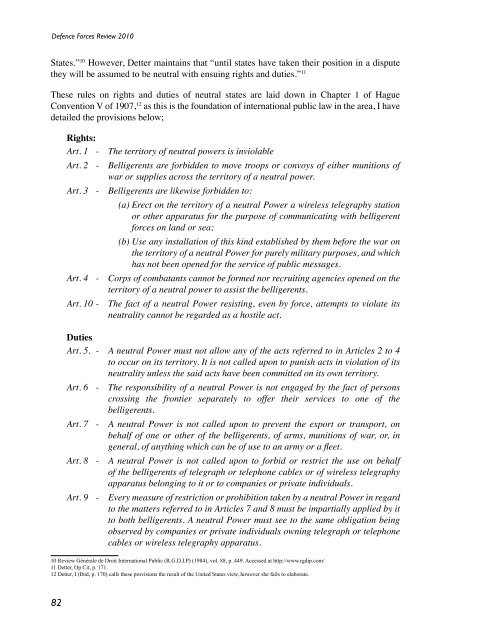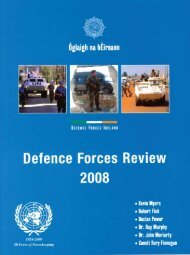Does Neutrality Law Matter?Does Neutrality Law Matter?Simon DeignanThe laws of neutrality are those regulating the coexistence of war and peace. They wereformed for the purposes of the confinement of war, maintenance of trade, and preservation ofpeacetime relations. 1 Historically, neutrality was adopted as a means of security, retained ifit kept a state out of a war and abandoned if it did not. An early and perhaps one of the mostfamous examples of an attempted assertion of neutrality occurred during the Peloponnesianwar in the 5 th Century BC. During the struggle between Athens and Sparta the island state ofMelos resisted attempts to be co-opted into the Athenian war effort resulting in the slaughterof the male population and the enslavement of the women and children. 2 Clearly for theMelians to engage in a dialogue and invoke such an idea, a concept of neutrality and its legalconnotations must have existed between city states two and a half thousand years ago. Thisprinciple has changed surprisingly little over the years and developed alongside the laws ofwar until their partial codification in the Hague Conventions of 1899 and 1907, which led tothe classification of the laws governing the rights and duties of neutral states in 1907, which isthe foundation for today’s neutrality law. However, these laws were developed during a timewhen war was not prohibited, before the existence of a United Nations Charter, 3 and the ideaof collective security, and thus are perhaps not as relevant today. I will examine the meaningof modern neutrality and attempt to join the jig-saw principles of neutrality. I will then ponderwhether modifications should be made to the existing laws and what the advantages, or indeed,the disadvantages of such changes would be to neutral states such as Ireland.The Principles of NeutralityWhat is a neutral state, how does one become neutral and what must one do? These arequestions that continue to arise in international relations today, leading to considerableconfusion among states, such as Ireland. According to Detter, 4 a state is considered ‘neutral’ ifit is entrenched in a treaty 5 , or by a specific declaration 6 , or through its permanent neutrality. 7Ireland fits into the declaration category, first used in World War II and since, through aNational Declaration in various EU Treaties. 8 However, the International Law Commissionterms a unilateral declaration ‘imperfect’, 9 after all is a country neutral if no other statesrecognise it as such? Rousseau states, “It is, however, doubtful from the legal point of viewwhether such a procedure is sufficient to establish permanent neutrality status enforceableagainst third States in the absence of a subsequent treaty and unequivocal recognition by such1 Chadwick, E. (2002) Traditional Neutrality Revisited. Kluwe Law International, p. 4.2 Thucydides, Peloponnesian War, Penguin classics, 5.84, p. 114.3 Notably Article 2(4): all members shall refrain in their international relations from the threat or use of force against the territorial integrity or politicalindependence of any state, or in any other manner inconsistent with the Purposes of the United Nations.4 Detter, I. (2000) The Law of War, Cambridge University Press, 2 nd Ed, pp. 170-171.5 As in the case of Austria under the State Treaty of 1955, 217 UNTS 2236 As in the case of Austria under the State Treaty of 1955, 217 UNTS 2237 Thus Switzerland is permanently neutral8 The National Declaration reaffirms Ireland’s continued attachment to its traditional policy of military neutrality and confirms, in line with this policy, that(i) Ireland is not party to any mutual defence commitment; (ii) that Ireland is not party to any plans to develop a European army; and (iii) that Irelandwill take a sovereign decision, on a case by case basis, on whether the <strong>Defence</strong> <strong>Forces</strong> should participate in humanitarian or crisis management tasksundertaken by the EU, based on the triple lock of UN authorisation, Government decision and approval by Dáil Éireann – Taken from Department ofForeign Affairs website9 A/CN.4/542 - SEVENTH REPORT ON UNILATERAL ACTS OF STATES 22 April 200481
<strong>Defence</strong> <strong>Forces</strong> <strong>Review</strong> <strong>2010</strong>States.” 10 However, Detter maintains that “until states have taken their position in a disputethey will be assumed to be neutral with ensuing rights and duties.” 11These rules on rights and duties of neutral states are laid down in Chapter 1 of HagueConvention V of 1907, 12 as this is the foundation of international public law in the area, I havedetailed the provisions below;Rights:Art. 1 - The territory of neutral powers is inviolableArt. 2 - Belligerents are forbidden to move troops or convoys of either munitions ofwar or supplies across the territory of a neutral power.Art. 3 - Belligerents are likewise forbidden to:(a) Erect on the territory of a neutral Power a wireless telegraphy stationor other apparatus for the purpose of communicating with belligerentforces on land or sea;(b) Use any installation of this kind established by them before the war onthe territory of a neutral Power for purely military purposes, and whichhas not been opened for the service of public messages.Art. 4 - Corps of combatants cannot be formed nor recruiting agencies opened on theterritory of a neutral power to assist the belligerents.Art. 10 - The fact of a neutral Power resisting, even by force, attempts to violate itsneutrality cannot be regarded as a hostile act.DutiesArt. 5. - A neutral Power must not allow any of the acts referred to in Articles 2 to 4to occur on its territory. It is not called upon to punish acts in violation of itsneutrality unless the said acts have been committed on its own territory.Art. 6 - The responsibility of a neutral Power is not engaged by the fact of personscrossing the frontier separately to offer their services to one of thebelligerents.Art. 7 - A neutral Power is not called upon to prevent the export or transport, onbehalf of one or other of the belligerents, of arms, munitions of war, or, ingeneral, of anything which can be of use to an army or a fleet.Art. 8 - A neutral Power is not called upon to forbid or restrict the use on behalfof the belligerents of telegraph or telephone cables or of wireless telegraphyapparatus belonging to it or to companies or private individuals.Art. 9 - Every measure of restriction or prohibition taken by a neutral Power in regardto the matters referred to in Articles 7 and 8 must be impartially applied by itto both belligerents. A neutral Power must see to the same obligation beingobserved by companies or private individuals owning telegraph or telephonecables or wireless telegraphy apparatus.10 <strong>Review</strong> Générale de Droit International Public (R.G.D.I.P) (1984), vol. 88, p. 449. Accessed at http://www.rgdip.com/11 Detter, Op Cit, p. 171.12 Detter, I (Ibid, p. 170) calls these provisions the result of the United States view, however she fails to elaborate.82
















